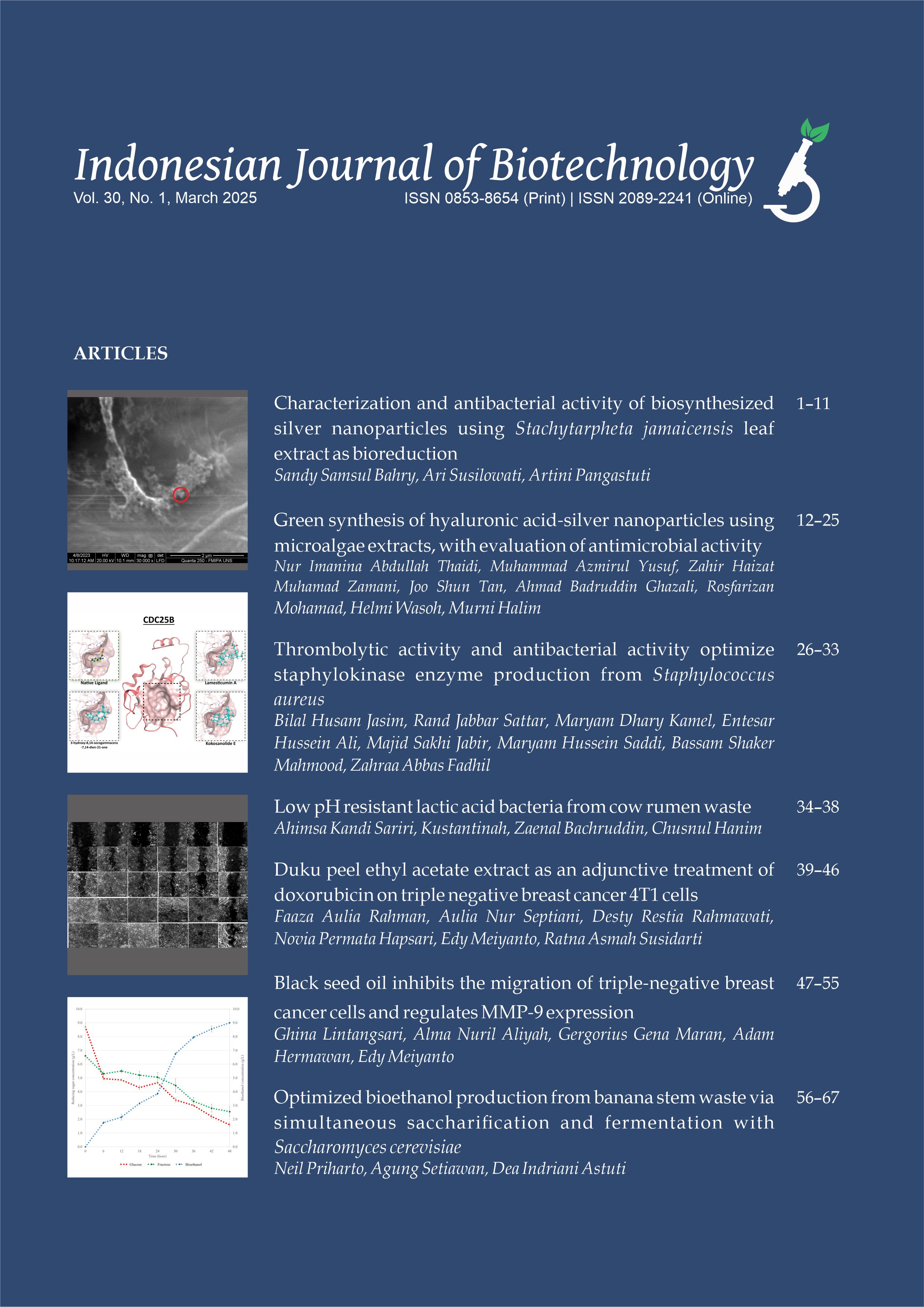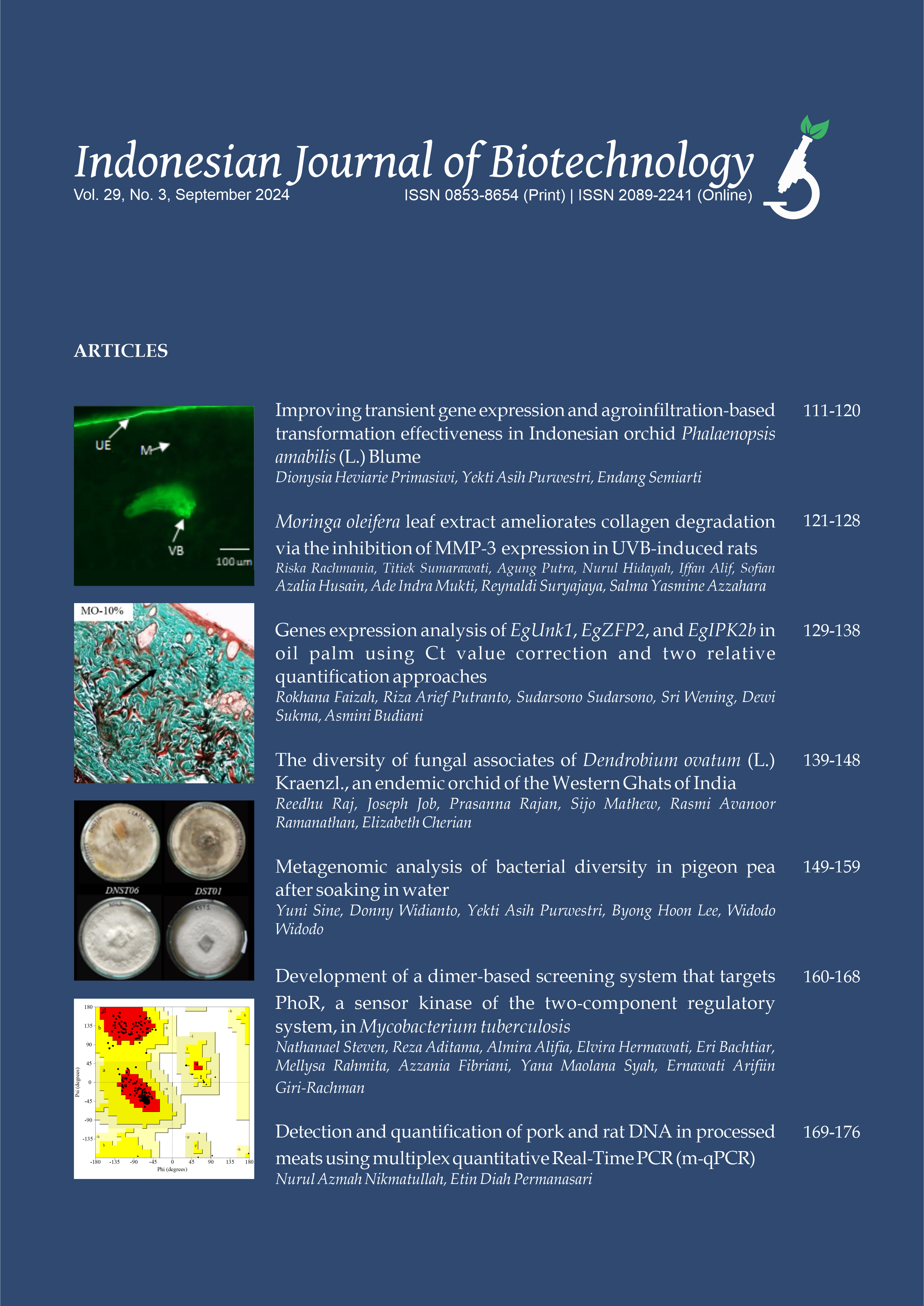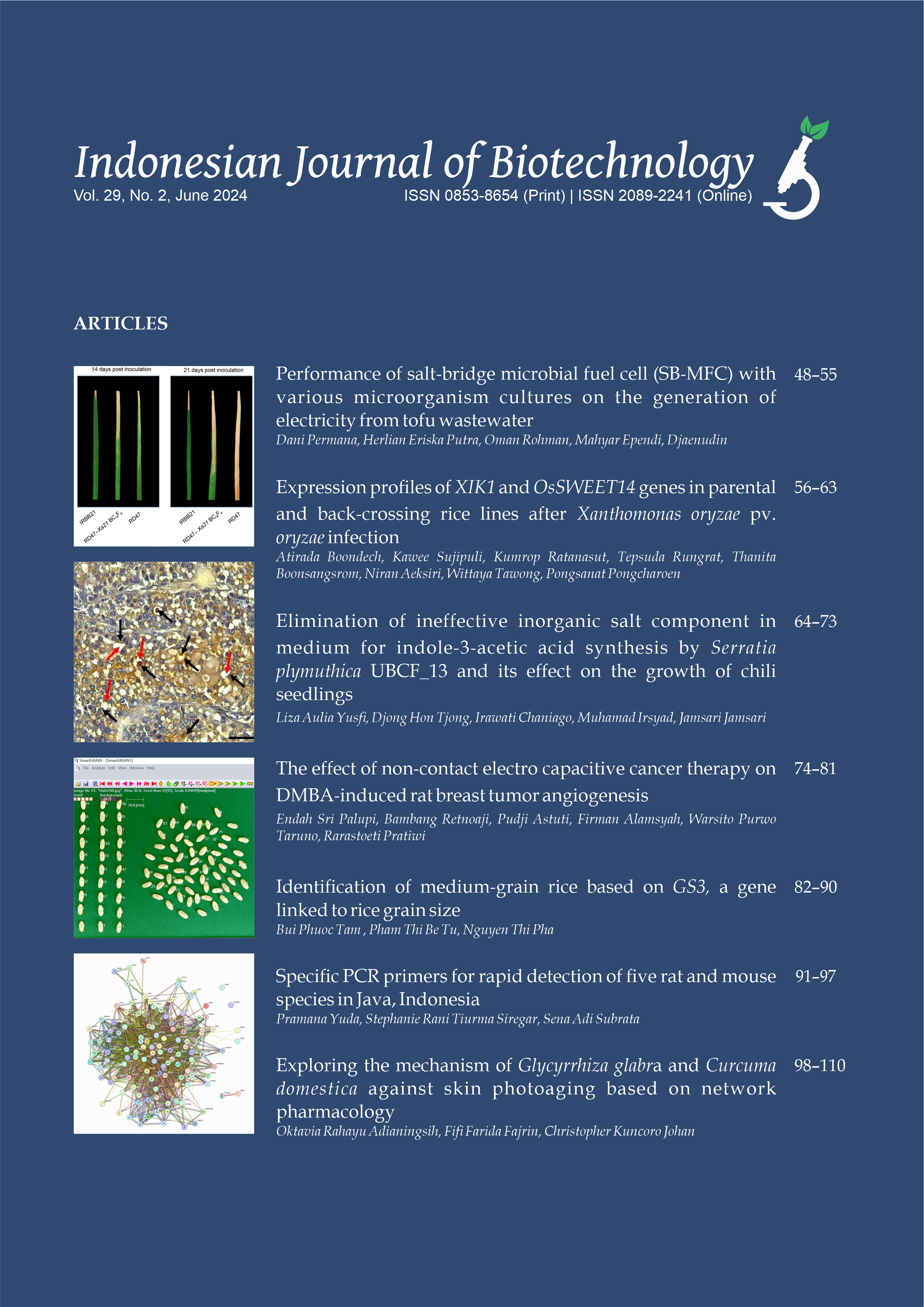Establishment of transgenic potato cultivar IPB CP1 plants containing gene encoding for superoxide dismutase to increase the abiotic stress tolerance
Musawira Musawira(1), Suharsono Suharsono(2*), Miftahudin Miftahudin(3), Aris Tjahjoleksono(4)
(1) Graduate School of Plant Biology, IPB University, Bogor 16680, Indonesia; Center for Biotechnology, IPB University, Bogor 16680, Indonesia
(2) Graduate School of Plant Biology, IPB University, Bogor 16680, Indonesia; Center for Biotechnology, IPB University, Bogor 16680, Indonesia; Department of Biology, Faculty of Mathematics and Natural Sciences, IPB University, Bogor 16680, Indonesia
(3) Graduate School of Plant Biology, IPB University, Bogor 16680, Indonesia; Department of Biology, Faculty of Mathematics and Natural Sciences, IPB University, Bogor 16680, Indonesia
(4) Graduate School of Plant Biology, IPB University, Bogor 16680, Indonesia; Department of Biology, Faculty of Mathematics and Natural Sciences, IPB University, Bogor 16680, Indonesia
(*) Corresponding Author
Abstract
Potato ( Solanum tuberosum L.) cultivar IPB CP1 is suitable as a raw material for the potato chip industry. Potato plants are sensitive to various abiotic stresses such as drought, aluminium and salinity, which induce reactive oxygen species (ROS). ROS is very toxic to plant cells. Superoxide dismutase (SOD) is one of the enzymes that catalyse ROS to H2O2 and O2. This study aimed to establish transgenic potato cv. IPB CP1 plants containing the MmCuZn‐SOD gene that are tolerant to various abiotic stresses. Genetic transformation using internodes without buds as explants produced putative transgenic potato with a transformation efficiency of 51.25% and a regeneration efficiency of 38.87%. Integration analysis of the MmCuZn‐SOD transgene in putative transgenic plants by polymerase chain reaction (PCR) with a set of specific primers showed that eight plants contained the MmCuZn‐SOD gene under the control of the 35S CaMV promoter. In vitro salinity stress, aluminium stress, and drought stress assays showed that transgenic plants had a higher number of roots and total root length than non‐transgenic ones. These results indicate that transgenic potato cv. IPB CP1 plants are more tolerant to abiotic stresses than non‐transgenic ones.
Keywords
Full Text:
PDFReferences
Bowler C, Montagu MV, D I. 1992. Superoxide dismutase and stress tolerance. Annu. Rev. Plant Physiol. Plant Mol. Biol. 43(1):83–116. doi:10.1146/annurev.pp.43.060192.000503.
Butaye KMJ, Cammue BPA, Delauré SL, De Bolle MFC. 2005. Approaches to minimize variation of transgene expression in plants. Mol. Breed. 16(1):79–91. doi:10.1007/s1103200549299.
Cartes P, McManus M, WulffZottele C, Leung S, GutiérrezMoraga A, Mora MdlL. 2012. Differential superoxide dismutase expression in ryegrass cultivars in response to short term aluminium stress. Plant Soil 350:353–363. doi:10.1007/s1110401109193.
Cervera M, Pina JA, Ju J, Navarro L, L P. 1998. Agrobacterium mediated transformation of citrange : Factors affecting transformation and regeneration. Plant Cell Rep. 18:271–278. doi:10.1007/s002990050570.
Damayanti F, Suharsono, Tjahjoleksono A, Mariska I. 2017. Agrobacterium tumefaciens mediated transformation of MmCu/ZnSOD gene to sugarcane (Saccharum officinarum cv PS 864) for acidic soil stress tolerance. Int. J. Agric. Biol. 19:1489–1496. doi:10.17957/IJAB/15.0448.
Du B, Nian H, Zhang Z, Yang C. 2010. Effects of aluminum on superoxide dismutase and peroxidase activities, and lipid peroxidation in the roots and calluses of soybeans differing in aluminum tolerance. Acta Physiol. Plant 32(5):883–890. doi:10.1007/s117380100476z.
FAOSTAT. 2021. Production of crops. URL http://www.fao.org/faostat/en/#data/QC.
Gea N, Suharsono, Wattimena GA, Widyastuti U. 2017. Introduction of Hd3a gene in IPB CP1 potato cultivar through Agrobacterium tumefaciensmediated. Pak. J. Biotechnol. 14(2):129–134. URL https://pjbt.org/index.php/pjbt/article/download/295/290.
Gelvin SB. 2017. Integration of Agrobacterium TDNA into the plant genome. Annu. Rev. Genet. 51:195-217. doi:10.1146/annurevgenet120215035320.
Gill SS, Anjum NA, Gill R, Yadav S, Hasanuzzaman M, Fujita M, Mishra P, Sabat SC, Tuteja N. 2015. Super oxide dismutasementor of abiotic stress tolerance in crop plants. Environ. Sci. Pollut. Res. 22(14):10375–10394. doi:10.1007/s1135601545325.
Gill T, Sreenivasulu Y, Kumar S, Singh AP. 2010. Overexpression of superoxide dismutase exhibits lignification of vascular structures in Arabidopsis thaliana. J. Plant Physiol. 167(9):757–760. doi:10.1016/j.jplph.2009.12.004.
Haddadi F, Aziz MA, Kamaladini H, Ravanfar SA. 2013. Thidiazuron and zeatininduced high frequency shoot regeneration from leafand shoottip explants of strawberry. Horttechnology 23(3):276– 387. doi:10.21273/horttech.23.3.276.
Hannum S. 2012. Isolation, cloning, and expression analysis of gene coding copper/zinc superoxide dismutase (CuZnSOD) from Melastoma malabathricum L. [Dissertation]. Bogor: Bogor Agricultural University.
Houmani H, RodríguezRuiz M, Palma JM, Abdelly C, Corpas FJ. 2016. Modulation of superoxide dismutase (SOD) isozymes by organ development and high longterm salinity in the halophyte Cakile maritima. Protoplasma 253(3):885–894. doi:10.1007/s0070901508501. Jajic I, Sarna T, Strzalka K. 2015. Senescence, stress, and reactive oxygen species. Plants 4:393–141. doi:10.3390/plants4030393.
Jing X, Hou P, Lu Y, Deng S, Li N, Zhao R, Sun J, Wang Y, Han Y, Lang T, Ding M, Shen X, Chen S. 2015. Overexpression of copper/zinc superoxide dismutase from mangrove Kandelia candel in tobacco enhances salinity tolerance by the reduction of reactive oxy gen species in chloroplast. Front Plant Sci. 6:1–13. doi:10.3389/fpls.2015.00023.
Kumar R, Mamrutha HM, Kaur A, Grewal A. 2017. Synergistic effect of cefotaxime and timentin to suppress the Agrobacterium over growth in wheat (Triticum aestivum L.) transformation. Asian J. Microbiol. Biotechnol. Environ. Sci. 19(4):961–967. URL http://www.envirobiotechjournals.com/article_abstract.php?aid=8347&iid=241&jid=1.
Lin J, Redies C. 2012. Histological evidence: House keeping genes betaactin and GAPDH are of limited value for normalization of gene expression. Dev. Genes Evol. 222(6):369–376. doi:10.1007/s004270120420x.
Lu F, Liang X, Lu H, Li Q, Chen Q, Zhang P, Li K, Liu G, Yan W, Song J, Duan C, Zhang L. 2017. Overproduction of superoxide dismutase and catalase confers cassava resistance to Tetranychus cinnabarinus. Sci. Rep. 7:1–13. doi:10.1038/srep40179.
Murashige T, Skoog F. 1962. A revised medium for rapid growth and bio assays with tobacco tissue cultures. Physiol. Plants 15:473–497. doi:10.1111/j.13993054.1962.tb08052.x.
Pal A, Acharya K, Vats SK, Kumar S, Ahuja PS. 2013. Overexpression of PaSOD in transgenic potato enhances photosynthetic performance under drought. Biol. Plant. 57(2):359–364. doi:10.1007/s105350120277-x.
Pasmawati, Tjahjoleksono A, Suharsono. 2021. Obtaining of transgenic potato (Solanum tuberosum L.) cultivar IPB CP3 containing LYZC gene resistant to bacterial wilt disease. Indones. J. Biotechnol. 26(1):48–53. doi:10.22146/IJBIOTECH.61682.
Rai GK, Rai NP, Kumar S, Yadav A, Rathaur S, Singh M. 2012. Effects of explant age, germination medium, preculture parameters, inoculation medium, pH, washing medium, and selection regime on Agrobacterium mediated transformation of tomato. Vitr. Cell Dev. Biol. Plant 48(5):565–578. doi:10.1007/s1162701294423.
Sharma P, Jha AB, Dubey RS, Pessarakli M. 2012. Reactive oxygen species, oxidative damage, and antioxidative defense mechanism in plants under stressful conditions. J. Bot. 2012:1–26. doi:10.1155/2012/217037.
Suharsono. 2002. Construction of genomic library of soybean cultivar slamet. Hayati 9(3):67.
Tertivanidis K, Goudoula C, Vasilikiotis C, Hassiotou 452 E, PerlTreves R, Tsaftaris A. 2004. Superoxide dismutase transgenes in sugarbeets confer resistance to oxidative agents and the fungus C. beticola. Transgenic Res. 13(3):225–233. doi:10.1023/B:TRAG.0000034610.35724.04.
Visser RGF, Jacobsen E, HesselingMeinders A, Schans MJ, Witholt B, Feenstra WJ. 1989. Transformation of homozygous diploid potato with an Agrobacterium tumefaciens binary vector system by adventitious shoot regeneration on leaf and stem segments. Plant Mol. Biol. 12(3):329–337. doi:10.1007/BF00043210.
Wang F, Wang Q, Kwon S, Kwak S, Su W. 2005. Enhanced drought tolerance of transgenic rice plants expressing a pea manganese superoxide dismutase. J. Plant Physiol. 162:465–472. doi:10.1016/j.jplph.2004.09.009.
Wang W, Xia MX, Chen J, Yuan R, Deng FN, Shen FF. 2016. Gene expression characteristics and regulation mechanisms of superoxide dismutase and its physiological roles in plants under stress. Biochem. 81(5):465–480. doi:10.1134/S0006297916050047.
Xu J, Yang J, Duan X, Jiang Y, Zhang P. 2014. Increased expression of native cytosolic Cu/Zn superoxide dismutase and ascorbate peroxidase improves tolerance to oxidative and chilling stresses in cassava (Manihot esculenta Crantz). BMC Plant Biol. 14(208):1–13. doi:10.1186/s1287001402084.
Yan H, Li Q, Park SC, Wang X, Liu YJ, Zhang YG, Tang W, Kou M, Ma DF. 2016. Overexpression of CuZnSOD and APX enhance salt stress tolerance in sweet potato. Plant Physiol. Biochem. 109:20–27. doi:10.1016/j.plaphy.2016.09.003.
Yang ZB, Eticha D, Albacete A, Rao IM, Roitsch T, Horst WJ. 2012. Physiological and molecular analysis of the interaction between aluminium toxicity and drought stress in common bean (Phaseolus vulgaris). J. Exp. Bot. 63(8):3109–3125. doi:10.1093/jxb/ers038.
Zhang H, Xu F, Wu Y, Hu HH, Dai XF. 2017. Progress of potato staple food research and industry development in China. J. Integr. Agric. 16(12):2924–2932. doi:10.1016/S20953119(17)617362.
Article Metrics
Refbacks
- There are currently no refbacks.
Copyright (c) 2022 The Author(s)

This work is licensed under a Creative Commons Attribution-ShareAlike 4.0 International License.









